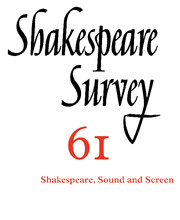Book contents
- Frontmatter
- Sarah Siddons, theatre voices and recorded memory
- Playing with Shakespeare’s play: Branagh’s Love’s Labour’s Lost
- Bottom and the gramophone: Media, class and comedy in Michael Hoffman’s A Midsummer Night's Dream
- Maurice Evans’s Richard II on Stage, Television and (Almost) Film
- Richard II on the Screen
- ‘Where Lies Your Text?’: Twelfth Night in American Sign Language Translation
- ‘This uncivil and unjust extent against thy peace’: Tim supple’s Twelfth Night, or what violence will
- ‘There’s no such thing’: nothing and nakedness in Polanski’s Macbeth
- Ghosts and mirrors: the gaze in film Hamlets
- ‘Ben, it’s a terrible thing to hate your mother’: mind control in Hamlet and The Manchurian Candidate
- Channelling the ghosts: the Wooster Group’s remediation of the 1964 Electronovision Hamlet
- Listening to Prospero’s Books
- Lend Me Your Ears: Sampling BBC Radio Shakespeare
- An Age of Kings and The ‘Normal American’
- Shakespeare and British Television
- A Local Habitation and a Name: Television and Shakespeare
- Paying attention in Shakespeare parody: from Tom Stoppard to YouTube
- Madagascan will: cinematic Shakespeares / transnational exchanges
- Still life? Anthropocentrism and the fly in Titus Andronicus and Volpone
- Riddling q1: Hamlet’s mill and the trickster
- ‘Speak, that I may see thee’: Shakespeare characters and common words
- Who do the people love?
- A Partial Theory of Original Practice
- Shakespeare Performances in England, 2007
- Professional Shakespeare productions in the British Isles, January–December 2006
- The Year's Contributions to Shakespearian Study 1 Critical studies
- 2 Shakespeare in performance
- 3a Editions and textual studies
- 3b Editions and textual studies: The RSC Complete Works
- Index to Volume 61
‘There’s no such thing’: nothing and nakedness in Polanski’s Macbeth
Published online by Cambridge University Press: 28 November 2008
- Frontmatter
- Sarah Siddons, theatre voices and recorded memory
- Playing with Shakespeare’s play: Branagh’s Love’s Labour’s Lost
- Bottom and the gramophone: Media, class and comedy in Michael Hoffman’s A Midsummer Night's Dream
- Maurice Evans’s Richard II on Stage, Television and (Almost) Film
- Richard II on the Screen
- ‘Where Lies Your Text?’: Twelfth Night in American Sign Language Translation
- ‘This uncivil and unjust extent against thy peace’: Tim supple’s Twelfth Night, or what violence will
- ‘There’s no such thing’: nothing and nakedness in Polanski’s Macbeth
- Ghosts and mirrors: the gaze in film Hamlets
- ‘Ben, it’s a terrible thing to hate your mother’: mind control in Hamlet and The Manchurian Candidate
- Channelling the ghosts: the Wooster Group’s remediation of the 1964 Electronovision Hamlet
- Listening to Prospero’s Books
- Lend Me Your Ears: Sampling BBC Radio Shakespeare
- An Age of Kings and The ‘Normal American’
- Shakespeare and British Television
- A Local Habitation and a Name: Television and Shakespeare
- Paying attention in Shakespeare parody: from Tom Stoppard to YouTube
- Madagascan will: cinematic Shakespeares / transnational exchanges
- Still life? Anthropocentrism and the fly in Titus Andronicus and Volpone
- Riddling q1: Hamlet’s mill and the trickster
- ‘Speak, that I may see thee’: Shakespeare characters and common words
- Who do the people love?
- A Partial Theory of Original Practice
- Shakespeare Performances in England, 2007
- Professional Shakespeare productions in the British Isles, January–December 2006
- The Year's Contributions to Shakespearian Study 1 Critical studies
- 2 Shakespeare in performance
- 3a Editions and textual studies
- 3b Editions and textual studies: The RSC Complete Works
- Index to Volume 61
Summary
The ‘nothing’ that persistently haunts the images of Macbeth has been interpreted in terms of a condition of language and of self. After murdering Duncan, Macbeth appears ‘lost’ in thought and tells his wife, ‘To know my deed, ’twere best not know myself’ (2.2.69–71). As he pursues a future foretold to him by the prophecies of the three Weird Sisters, he begins to identify less and less with his former self, until ‘All causes ... give way’ (3.4.135) and life is no more than a ‘walking shadow’, absent of truth or meaning (5.5.23). Terry Eagleton writes that, in seeking to take possession of the throne, Macbeth will, in fact, ‘become less than human in trying to become more’, until eventually too much ‘inverts itself into nothing at all’. Malcolm Evans extends a reading of the protagonist’s loss of identity to a more thorough exploration of ‘the crisis of the sign and unequivocal discourse in the play’. For Evans, the ‘potentially baffling opacity’ of the play’s linguistic modes is a disorder that moves beyond the ‘imperfect’ speaking of the Witches to several other central characters in Macbeth.
However, given the ‘double’ nature of the Witches in leading Macbeth towards a prophesized future that will both ‘scorn / The power of man’ (4.1.95–6) and bring about his own downfall, the most immediate explanation for the play’s signified nothing lies with the Witches themselves, or more specifically, with the ambiguous territory of the female body.5 For the male, to look on the naked female body and its external lack may provoke a sense of absence within the male himself, as the power of the incomprehensible female ‘nothing’ subsequently threatens to become everything: ‘a yawning abyss within which man can lose his virile identity’.
- Type
- Chapter
- Information
- Shakespeare Survey , pp. 104 - 115Publisher: Cambridge University PressPrint publication year: 2008

